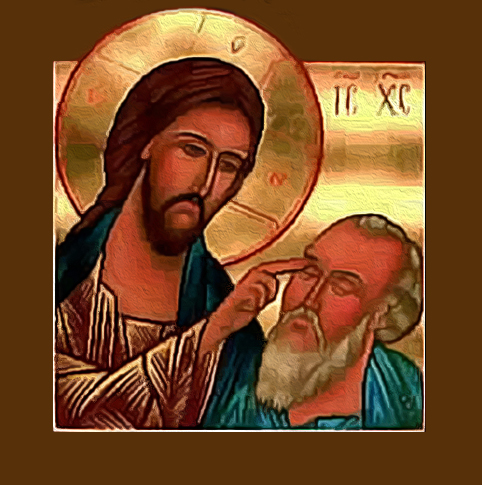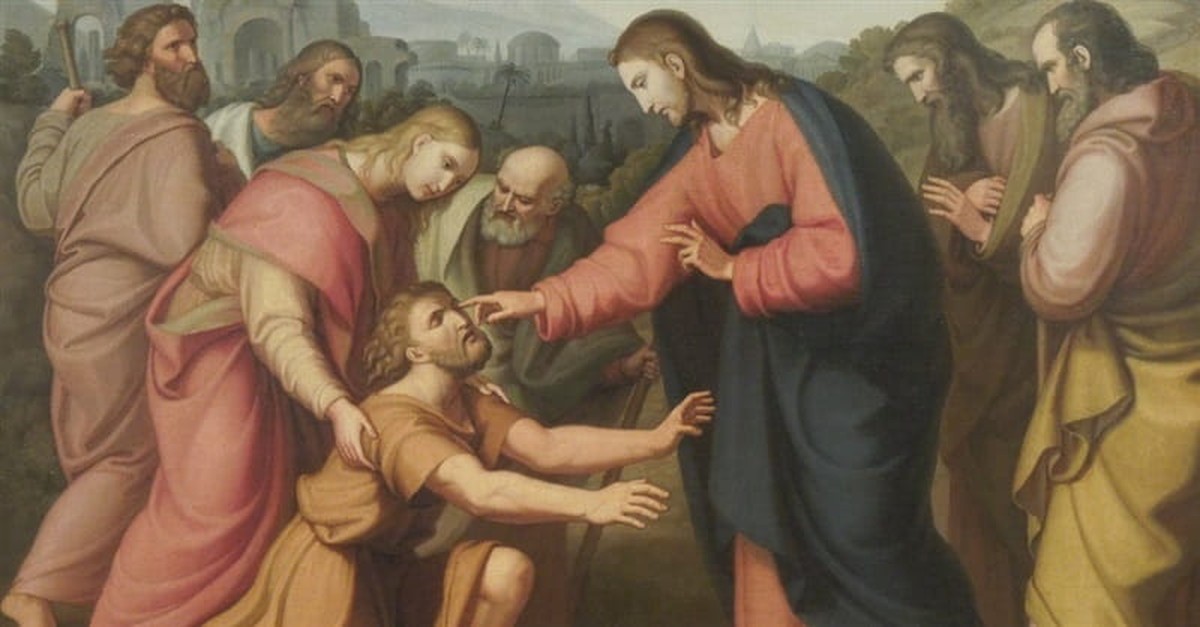Who is Bartimaeus? All we know about him is that he is the son of Timaeus, and that he is blind. And as far as details in the story go, that's all you need to know. Everything else isn't exactly relevant to the conversation.
And that's all anyone knew about him. Blind Bartimaeus. And I'll bet that he did exactly what you'd expect him to do - sat by the same place, begging in the same location. Likely an area that got a lot of foot traffic, where he would get maximum exposure, and people would know who he was, which they did. Blind Bartimaeus, as much of a fixture as a building or a signpost, regular enough to give directions by . And that helps if you're blind. If you know the features and the topography, you can get yourself around okay, but you really don't want to go too far afield. Stepping into the unknown is terrifying, as you can't see what may be ahead, so you stay in a world that you understand. So you stick to what you've got, you don't take too many chances, and you play it pretty safe. And boy oh boy, Bartimaeus would just hang out there at the fringes, and wait for people to come by, and hope that they'd contribute something to him.
But guess what. We're dealing with a problem that hasn't gone away. We've gotten better at giving people better access to services, we've gotten better at providing them with opportunities, that kind of thing, but what we haven't really gotten better at has been how we treat the disabled. That is, we still have a real paternalistic attitude towards them . We still look down on them, treat them like children, and talk over them and past them. After all, what do they have to contribute? What do we care?
This has really continued. It's still a problem where people will not exactly treat one another equally. The needier someone is, the greater the likelihood that we will treat them like overgrown children. That's true now, and it was true in the time of Christ. Here's the reading for this Sunday in the Good News translation which I think captures the tone quite well.
46 They came to Jericho, and as Jesus was leaving with his disciples and a large crowd, a blind beggar named Bartimaeus son of Timaeus was sitting by the road. 47When he heard that it was Jesus of Nazareth, he began to shout, “Jesus! Son of David! Take pity on me!”
48 Many of the people scolded him and told him to be quiet. But he shouted even more loudly, “Son of David, take pity on me!”
49 Jesus stopped and said, “Call him.”
So they called the blind man. “Cheer up!” they said. “Get up, he is calling you.”
50 He threw off his cloak, jumped up, and came to Jesus.
51 “What do you want me to do for you?” Jesus asked him.
“Teacher,” the blind man answered, “I want to see again.”
52 “Go,” Jesus told him, “your faith has made you well.”
At once he was able to see and followed Jesus on the road.
Did you catch how they treated Bartimaeus? Not exactly politely, or as an adult who can make his own decisions. Rather, they scolded him. In other translations, it says that they 'rebuked' him, but to rebuke is one of those words that seems to exist only in the scriptures. It's like being scourged, that seems to only exist in the scriptures too, and it seems to only apply to Christ. To rebuke is to be in the scriptures, in a stained glass world, and to not be much in the real world. But to scold? Well, who is it who scolds?
Typically, you scold your inferiors. You scold people whom you have power over. Teachers scold students, parents scold children, and here, in this reading, the good people scold Bartimaeus. They know better than him, they're able bodied, he is not, and therefore, they feel free to scold him, and to effectively talk down to him. To diminish him, and to let him know who is in charge. In other words, you sit there and shush up, and we'll get to you when we get to you, if at all.
But Christ calls to him. And when Bartimaeus comes over to Jesus, Jesus asks him 'what is it that you want?' What a moment that is. Someone who has been scolded, walked past, ignored, and dismissed, has God in the flesh approaching him, and asking him what he would have him do. The Lord of life, the creator of the universe comes to a beggar and asks him what he wants. And for the first time, perhaps ever, Blind Bartimaeus gets to choose. What a moment. Blind Bartimaeus getting to select what it is that he would see happen, and Christ, the king of the universe, decides to allow.
Friends, this moment should remind us of two things for us to consider. One, that Bartimaeus really shouldn't have been treated like a small child. If this is someone that Christ spoke to, and didn't walk past or talk past, that should remind us that these are people who should not just be given charity, but who should be given dignity and respect. They're people too, you know, and should be treated accordingly. Their dependence on help shouldn't cause you to look down on them precisely because of point number two, which is that before Christ, we're all beggars. Able bodied or disabled, blind or sighted, impaired or not, we are all beggars at that throne of grace. And like it or not, we're all temporarily able-bodied. Our approach to the throne of Grace is not as equals, but is as beggars, people who are needy, who cannot provide for themselves. And Christ deigns to listen. To provide.
He asks us what we need. And he listens. We tell him about our troubles, our strife. We tell him about our weakness, our fears, our sickness and distress. We tell him all about how we need so much, and can provide so little. And then, we tell him what we want, and what we want is to live forever, to never run out, to never get tired or afraid.
And that's what he listens to. Like blind Bartimaeus, we can't fix that problem ourselves, and are reduced to, as those spiritually blind, calling out to Christ in desperation. And he listens. And he heals and restores. Our need doesn't keep us from Christ, in fact our need is the whole reason that he's here at all. To save and to restore those who know how needy they are. And once we work that out, we will cling to him all the more, as blind beggars finding the source of sight, life and salvation.


No comments:
Post a Comment